- Home
- Bobby Akart
False Flag Page 2
False Flag Read online
Page 2
As with all appliances, incidents with gas-fueled engines and turbines typically occurred during start sequences. The newer cogeneration plants in Europe—France and Denmark in particular—contained sophisticated auxiliary equipment, sensors, and control systems for the purposes of purging pressurized air within the network of piping. The latest technology incorporated into the European plants had large exhaust systems capable of handling significant volumes of stored COGAS during the restart sequence. It was recommended that forced ventilation should continue during idling of the jet engines throughout the start-up process, as high concentrations of unburnt gas could accumulate within the exhaust system and throughout the pipeline distribution network.
The team initiated the start-up sequence, but the turbines did not rotate. The engineers tried again, but nothing happened as the system misfired. They waited, heeding the warning to limit the number of start attempts. The team, and their French counterpart, was concentrating entirely on the firing of the jet engines. They did not focus on the requisite purging of combustible gases contained within the exhaust system and the pipeline network.
The team tried again and again. With each attempt, high concentrations of unburnt hydrocarbons backed up throughout the system. When the powerful jet engines finally fired for a moment, the team cheered and shared high fives. But after the engines groaned to a halt, dejection was the mood.
During the brief operation of the turbines, combustible gases were forced through the pipelines from Cambridge to the west, throughout Boston across the river. The steel pipes swelled, and the gases looked for a place to release—to purge.
Within minutes, the beating heart and arteries of the Boston power grid had an aneurysm.
Chapter 2
Thursday, September 8, 2016
5:51 a.m.
100 Beacon
Boston, Massachusetts
Sarge stood alone on the rooftop of 100 Beacon, staring across Cambridge in wonder of the darkness and the deafening silence that had overtaken his hometown, as Beantown was devoid of vehicle traffic. Ordinarily, Storrow Drive would be awake with commuters making their way downtown. The never-ending low hum of the vehicular traffic on the Mass Turnpike to his south would be evidence of Americans going about their lives, scurrying from one important destination to another.
Was this the new normal?
It had only been a few days since the cyber attack took away power and water from two hundred and ninety million Americans. America went from a nation enjoying Saturday night dinner dates or sporting events, to a country struggling to survive—under the specter of martial law.
Sarge was incredulous as he watched the arrogance of the President’s press conference the night before. He was too wound up to sleep and took Julia’s shift patrolling the rooftop and the rest of the top three floors of 100 Beacon.
Although information was limited, Sarge was privy to communications via the expansive network set up by Julia. Within a day of the grid collapse, they were fully informed. For other Americans, information was scarce. Not knowing consumed them initially. Then the realities that America was a powerless nation set in—as did the panic. On this sixth day, survival was all that mattered to most.
I knew this would happen!
Sarge’s lectures at Harvard Kennedy covered a variety of subjects, including national defense, global governance, and the subject of world economics. He tried to be impartial in his discussions, but it was impossible to avoid inserting his world view when exploring these concepts. He warned his class about the fragility of society and the dangerous threats that one nation could pose to another. He talked about advanced weaponry like electromagnetic pulse weapons, bioterror, and, of course, cyber warfare. Did his students prepare? Doubtful. Sarge knew that most Americans who were interested enough to advanced their level of knowledge on these subjects still had enough doubt in their minds regarding the realities of these threats. Sarge had no doubt, and he prepared accordingly.
He ambled along the building’s rooftop, periodically looking over the edge for signs of activity along the street. He kicked a pebble into one of the roof’s scuppers and listened as it found its way down the drainpipe to the ground eleven stories below. He stopped and stared out across Boston Common to the southeast. It was completely deserted.
So this is what TEOTWAWKI looks like.
Sarge thought about this for a moment—the end of the world as we know it. It doesn’t have to mean it’s the end of the world. The situation was bad for most, but it could be worse. Sarge was exceedingly concerned about the events surrounding the cyber attack. He’d observed the increased Russian military activity along the U.S. coastal waters. Putin had amassed an army in the Arctic. All signs pointed toward a potential incursion onto American soil. It was the Russians modus operandi to use cyber attacks as a precursor to war. Estonia, Georgia, Ukraine, and Turkey had all experienced Russia’s use of cyber warfare to collapse their financial institutions and critical infrastructure in advance of military action. With Americans losing hope every day, the country was weakened. Sarge hoped that the military was prepared for every contingency.
If the Russians are preparing for World War III, why is the President using American soldiers to clamp down on our constitutional rights by declaring martial law?
Sarge watched the sun begin to peek through the skyscrapers of Boston, bearing names like John Hancock, Prudential, and the Federal Reserve. Sarge doubted that John Hancock would find anything prudent about the Federal Reserve.
The situation throughout the country was dire. In the large urban centers, the impact was felt immediately. Opportunists seized the night, taking advantage of a shocked populace and an outgunned law enforcement community. As despair spread across the nation, even midsized cities felt the impact. Julia was able to confirm that although rural areas experienced the collapse of the grid, thus far they had been spared from the collapse of society.
Where do we go from here?
With the arrival of Steven and Katie yesterday, Sarge was able to lift that concern out of his mind. They had been out of communication for days, and despite Steven’s extraordinary capabilities, Sarge was worried about his brother. His making an entrance was both theatrical and typical for Steven. My brother is a magnet for excitement. After a brief conversation, and some dinner, Steven started on the rest he needed to heal his gunshot wound. At some point, the four of them would have to discuss their future. There were so many issues to address.
Should they stay at 100 Beacon or travel to the rural safety of Prescott Peninsula?
If they remained in Boston, did they hunker down and react to events, or did they become active in any rebuilding effort?
But a troubling question hung over his head like a dark cloud. Who caused this, and how long will it last?
“Do we just try to survive?” asked Sarge aloud. He glanced down at the front entrance and then up and down Beacon Street, which was free from activity. The sun was getting brighter and he looked toward Cambridge. He wondered whether he would ever teach again. He thought about the students he had taught over the last ten years. Then, his thoughts were interrupted.
Chapter 3
Thursday, September 8, 2016
6:13 a.m.
100 Beacon
Boston, Massachusetts
Intuitively, Sarge sensed it first. He felt it coming. Inexplicably, Sarge knew it would be devastating. In the relative quiet of Cambridge across the Charles River, a hissing sound filled the air. A gaggle of Canadian geese, which had been resting on the muddy bank of the river, suddenly took flight. Sarge brought his AR-15 to low ready as the first explosions shook the building.
A geyser of hot steam broke through Amherst Street, which traversed east to west through the heart of MIT. A shower of mud and flying debris rose into the dark sky until it was eye level to Sarge. The cloud of steam continued skyward and then a second explosion occurred to the east. Sarge ducked and then ran past the hot tub towards the cloud undulating in
to the morning sun.
The height and breadth of this explosion obliterated his view of Mass General, which was less than a mile away. The entire complex was engulfed in smoke. Drivers, apparently startled by the events, hit each other on Storrow and careened down an embankment towards The Esplanade.
Another explosion occurred across the river near the Charles River Dam. As 100 Beacon shook from the blast, Sarge ducked again and looked towards the sky. Are we being bombed? Then another violent eruption shook the ground. This time, a large crater formed at the base of the Longfellow Bridge connecting Cambridge to downtown Boston. A towering cloud of swirling steam rose into the sky for nearly four hundred feet.
Car alarms were sounding all around. Then another explosion came from the downtown area. Steam rose into the sky, taller than the newly completed Millennium Tower, which stood seven hundred feet above ground. For a brief moment, the rising sun was obscured by the debris, and then the winds created gaps allowing the light to shine through.
Sarge was mesmerized. It reminded him of a scene from the Apocalypse Now movie. The sound of collapsing concrete and steel snapped him out of his trance as he looked back towards Cambridge. Another blast widened the crater at the Longfellow Bridge. The structure had been compromised, and the central span of the bridge was giving way.
Panicked, some drivers were attempting to back off the bridge, but the steam swallowed them from view. Others frantically turned back towards the billowing steam that surrounded Mass General. Suddenly, the bridge gave way as the structure and deck of a two-hundred-foot span of Longfellow Bridge collapsed into the Charles River. At least a dozen cars sank to the bottom, only the red illuminated taillights indicating their path to the murky depths below.
A vehicle on the south side of the bridge caught fire. A pickup pulling a trailer rested precariously against the guardrail of the collapsed structure, near the burning car. Sarge could hear the screams of motorists on the bridge, attempting to escape the collapse.
“What the fuck, Sarge?” screamed Steven as he ran onto the rooftop with Julia and Katie close behind. The sun was rising and their view of the carnage was getting better.
“Are you okay, Sarge?” asked Julia as she reached Sarge’s side. The four of them looked from Boston to the east across the Charles to Cambridge in the west. The sky was dense with steam, silt, and flying debris. Longfellow Bridge continued to creak as it struggled to stand.
“I’ve counted at least a dozen explosions,” said Sarge. “Look at the steam rising out of the ground.” Sarge directed their attention to the massive craters left by the escaping steam and debris. Another vehicle crash distracted them momentarily.
“Were we bombed?” asked Julia. She was trembling as she hung on to Sarge’s arm. She was badly shaken by this, or the culmination of the entire situation.
“No,” replied Sarge. “I saw it. I mean, I felt it coming.” Sarge looked at the ground, looking for the right words.
“What do you mean, bro?” asked Steven.
“I mean, I could tell something was about to happen, and then the ground began to erupt,” said Sarge. He loosened his grip on his rifle and slung it over his shoulder. He turned his attention to Julia and gave her a reassuring look. “Something happened underground. It looks like a bad day at Yellowstone Park.”
Moisture and debris began to fall on them from the north as the winds picked up. Steven shielded his eyes and looked around.
“Maybe we should get inside,” said Steven. “I don’t know what this stuff is, but it could be toxic.” The four of them turned toward the stairwell when one final massive blast knocked them to the roof deck. The sound was deafening. Katie and Julia screamed as the guys scrambled to cover them.
In Cambridge, the Kendall Cogeneration Station, the latest-and-greatest innovation in green-energy production, disintegrated and took three city blocks with it. Lights out, for a long time.
Chapter 4
Thursday, September 8, 2016
8:42 a.m.
100 Beacon
Boston, Massachusetts
Julia stood at the window and watched as the clouds of debris began to dissipate. For over two hours, their views of Boston and Cambridge were obstructed. The reinforced windows Sarge had installed during the initial renovation of 100 Beacon withstood the blast, but the residents of the lower floors were not so fortunate. Virtually all of the windows on the east and north sides of the surrounding buildings were shattered, throwing bits and pieces of plate glass to the sidewalk below.
A pipeline explosion like this had happened before. In the summer of 2007, an underground steam pipe exploded during the evening rush hour at the Grand Central Terminal. Steam, mud, and pieces of concrete were hurled forty stories into the Manhattan sky. Dozens of people were injured during the blast, primarily from the panic at the busy intersection. The carnage Julia was observing was much worse. There were immense craters spewing steam in every direction of the city.
She tried not to be overwhelmed, but despair did cross her mind from time to time. She was safe, and they’d sufficiently prepared for a collapse event just like this one. But Julia wrestled with her concern for others. People aimlessly walked along the sidewalk, appearing lost and disoriented. Not only had they lost the lives they were accustomed to, but now their homes were destroyed. Haven’t people suffered enough?
Katie joined her and stood silently for a moment, taking it all in. Finally, Julia spoke.
“This is unimaginable, Katie. Look at these buildings. This is not Ukraine or some city in the Middle East. This is our home, Boston. It looks like it’s been bombed.” Julia pressed her palms against the window, unconsciously trying to reach out.
“I know, Julia,” said Katie. “We’re very lucky.” Katie put her hand on Julia’s shoulder in an attempt to comfort her.
“It’s not that we’re lucky, Katie. We knew our country faced threats, and we prepared accordingly. But no one could have expected this.” Julia drew a line across the glass with her index finger, tracing the destruction from Cambridge to the north all the way to downtown Boston, where steam still billowed skyward. “We have to do something.”
The stairwell door slammed, and Julia heard the guys’ voices as they approached. She couldn’t hide her emotions and a few tears streamed down her face. As Sarge and Steven approached, in an attempt to stay strong, she tried to cover her face.
Sarge knew her too well, however. “Honey, what’s wrong?” he asked.
Julia tried, but couldn’t contain her feelings any longer. She broke down crying. “Sarge, we have to do something for them.” She sniffled out the words, waving her arm towards the windows. “They didn’t deserve this. Is it fair for us to hide up here in our fortified penthouses while so many innocent people are suffering out there?” Julia couldn’t hide her sarcasm.
Steven started to speak, but Katie grabbed his arm and pulled him back. Sarge took Julia in his arms and held her until she recovered. Julia had held it together during these first six days. The fast pace in which events occurred and the large amount of activity at 100 Beacon had kept her from focusing on the reality.
“I understand where you’re coming from,” said Sarge, breaking the tension. “This is a conversation that is overdue. But now that Steven and Katie are safe with us, let’s talk. Okay?”
Julia, still sniffling, wiped her eyes with her sleeves and nodded. The four made their way to the couches. Katie grabbed a bottle of water for Julia, who held it against her neck. Without the generator running, the interior of 100 Beacon was stuffy and warm. This had a calming effect on her.
“It’s very dangerous out there, Julia,” started Steven. “I’ve been shot a few times, but never on American soil. I knew things would suck after the shit hit the fan, but I didn’t expect to be shooting at each other within days of it happening.”
“I know, Steven,” said Julia. “But what are we supposed to be doing?”
“Surviving,” replied Steven. He slumped back into the so
fa, wincing as his shoulder hit the padding.
“We are, but where do we go from here?” asked Julia. “I guess I’m just trying to get an overall view of what we’re supposed to be doing.” She looked to Sarge for guidance, as she was having trouble finding the words to express her feelings. Sarge rescued her.
“Listen, guys, let’s not put too much pressure on ourselves right now to set a course for our lives,” said Sarge. “First, let’s be thankful we’re still alive. Steven was shot and survived. These two were in three gunfights in five days. I was chased by people who clearly wanted to kill me—just because I made the mistake of driving through their neighborhood!”
“That’s right,” added Steven. “The situation is only going to get more dangerous. As people get more desperate, they will become a threat.”
“And obviously, gangs are starting to form,” said Katie. “The opportunists out there know there is strength in numbers. It’s a matter of time before looting gets out of hand.”
Julia listened to their words, but her focus was still on the injured and the people displaced from their homes. “I know all that,” Julia said. “It’s a matter of time before our neighbors, or thugs, try to beat our doors down. Isn’t there something we can do right now, today, for the people who just had their asses blown up?” Julia shouted the last part of her statement. She could tell that the consensus was to stay put. Her gut told her she should try to help others. It would come back to them someday.
The room was silent for a few awkward moments. Sarge stood and walked towards the windows, hands in his pockets. Shaking his head, he turned and spoke.

 Geostorm The Collapse: A Post Apocalyptic EMP Survival Thriller (The Geostorm Series Book 3)
Geostorm The Collapse: A Post Apocalyptic EMP Survival Thriller (The Geostorm Series Book 3)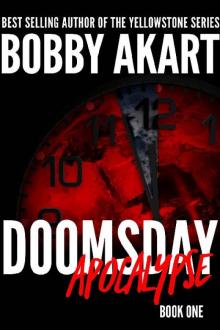 Doomsday Apocalypse
Doomsday Apocalypse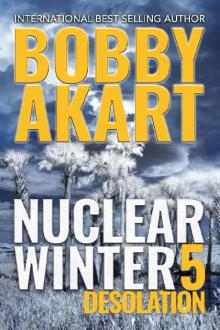 Nuclear Winter Desolation: Post Apocalyptic Survival Thriller (Nuclear Winter Series Book 5)
Nuclear Winter Desolation: Post Apocalyptic Survival Thriller (Nuclear Winter Series Book 5)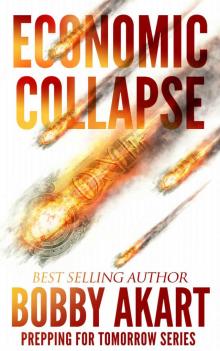 Economic Collapse (Prepping for Tomorrow Book 2)
Economic Collapse (Prepping for Tomorrow Book 2)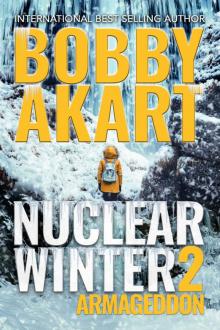 Nuclear Winter Armageddon
Nuclear Winter Armageddon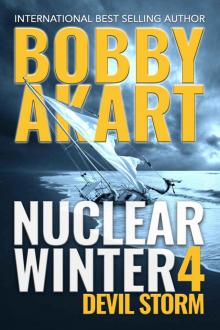 Nuclear Winter Devil Storm
Nuclear Winter Devil Storm Virus Hunters 3: A Medical Thriller
Virus Hunters 3: A Medical Thriller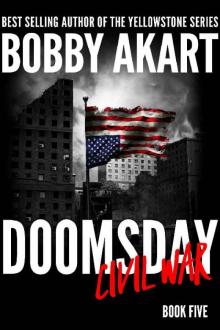 Doomsday Civil War: A Post-Apocalyptic Survival Thriller (The Doomsday Series Book 5)
Doomsday Civil War: A Post-Apocalyptic Survival Thriller (The Doomsday Series Book 5)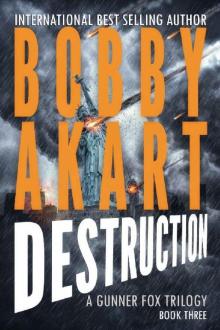 Asteroid Destruction
Asteroid Destruction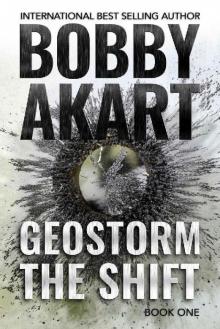 Geostorm the Shift
Geostorm the Shift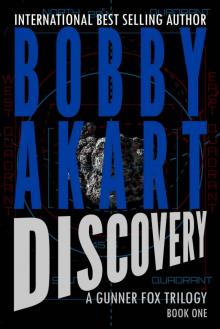 Asteroid Discovery
Asteroid Discovery Virus Hunters 2: A Medical Thriller
Virus Hunters 2: A Medical Thriller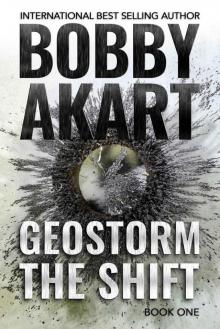 Geostorm The Shift: A Post-Apocalyptic EMP Survival Thriller (The Geostorm Series Book 1)
Geostorm The Shift: A Post-Apocalyptic EMP Survival Thriller (The Geostorm Series Book 1)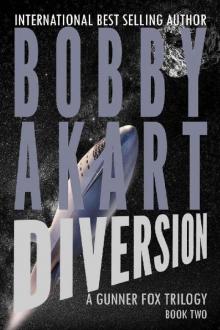 Asteroid Diversion
Asteroid Diversion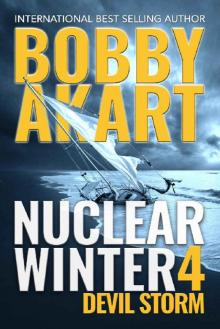 Nuclear Winter Devil Storm: Post Apocalyptic Survival Thriller (Nuclear Winter Series Book 4)
Nuclear Winter Devil Storm: Post Apocalyptic Survival Thriller (Nuclear Winter Series Book 4)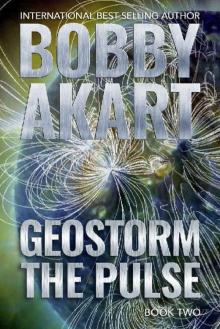 Geostorm The Pulse: A Post Apocalyptic EMP Survival Thriller (The Geostorm Series Book 2)
Geostorm The Pulse: A Post Apocalyptic EMP Survival Thriller (The Geostorm Series Book 2)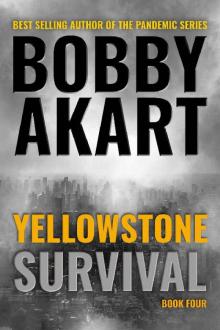 Yellowstone: Survival: A Post-Apocalyptic Survival Thriller (The Yellowstone Series Book 4)
Yellowstone: Survival: A Post-Apocalyptic Survival Thriller (The Yellowstone Series Book 4)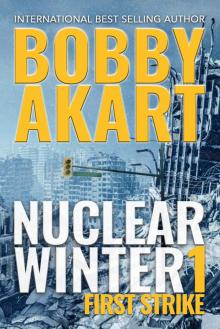 Nuclear Winter First Strike: Post-Apocalyptic Survival Thriller
Nuclear Winter First Strike: Post-Apocalyptic Survival Thriller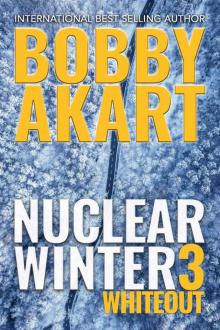 Nuclear Winter Whiteout
Nuclear Winter Whiteout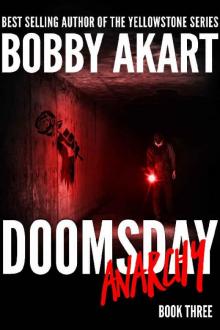 Doomsday Anarchy
Doomsday Anarchy Pandemic: Level 6: A Post Apocalyptic Medical Thriller Fiction Series (The Pandemic Series Book 3)
Pandemic: Level 6: A Post Apocalyptic Medical Thriller Fiction Series (The Pandemic Series Book 3) Martial Law
Martial Law Odessa Reborn: A Terrorism Thriller (Gunner Fox Book 4)
Odessa Reborn: A Terrorism Thriller (Gunner Fox Book 4)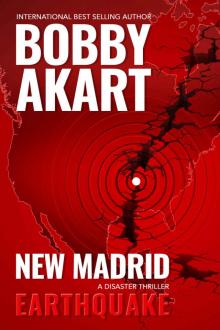 New Madrid Earthquake
New Madrid Earthquake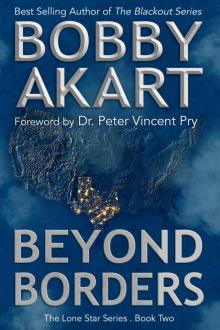 Beyond Borders: Post Apocalyptic EMP Survival Fiction (The Lone Star Series Book 2)
Beyond Borders: Post Apocalyptic EMP Survival Fiction (The Lone Star Series Book 2)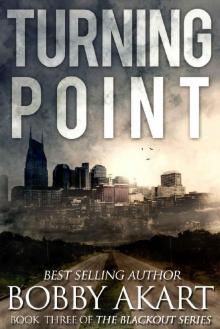 The Blackout Series (Book 3): Turning Point
The Blackout Series (Book 3): Turning Point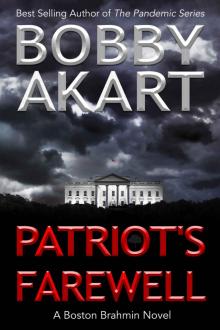 Patriot's Farewell: A Political Thriller Fiction Series (Boston Brahmin Political Thrillers Book 7)
Patriot's Farewell: A Political Thriller Fiction Series (Boston Brahmin Political Thrillers Book 7)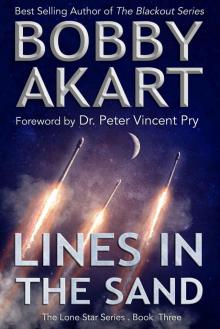 Lines in the Sand_Post Apocalyptic EMP Survival Fiction
Lines in the Sand_Post Apocalyptic EMP Survival Fiction The Mechanics: A Post-Apocalyptic Fiction Series
The Mechanics: A Post-Apocalyptic Fiction Series The Loyal Nine
The Loyal Nine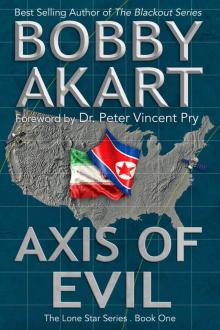 Axis of Evil
Axis of Evil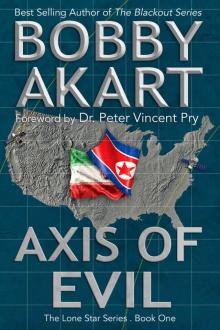 Axis of Evil: Post Apocalyptic EMP Survival Fiction (The Lone Star Series Book 1)
Axis of Evil: Post Apocalyptic EMP Survival Fiction (The Lone Star Series Book 1)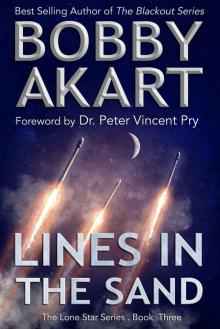 Lines in the Sand: Post Apocalyptic EMP Survival Fiction (The Lone Star Series Book 3)
Lines in the Sand: Post Apocalyptic EMP Survival Fiction (The Lone Star Series Book 3)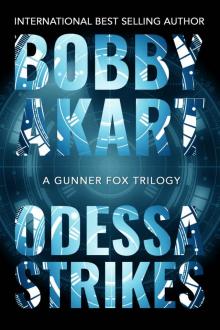 Odessa Strikes
Odessa Strikes The Blackout Series (Book 4): Shiloh Ranch
The Blackout Series (Book 4): Shiloh Ranch Hornet's Nest: A Post Apocalyptic EMP Survival Fiction Series (The Blackout Series Book 5)
Hornet's Nest: A Post Apocalyptic EMP Survival Fiction Series (The Blackout Series Book 5)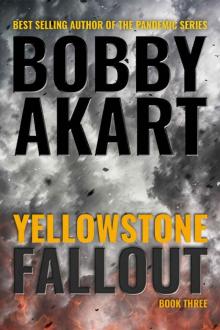 Yellowstone: Fallout: A Post-Apocalyptic Survival Thriller (The Yellowstone Series Book 3)
Yellowstone: Fallout: A Post-Apocalyptic Survival Thriller (The Yellowstone Series Book 3)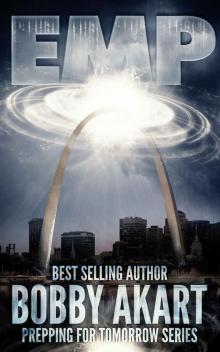 Electromagnetic Pulse
Electromagnetic Pulse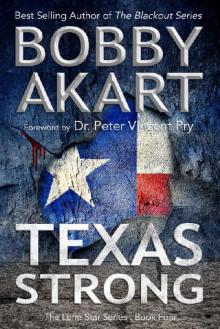 Texas Strong: Post Apocalyptic EMP Survival Fiction (The Lone Star Series Book 4)
Texas Strong: Post Apocalyptic EMP Survival Fiction (The Lone Star Series Book 4)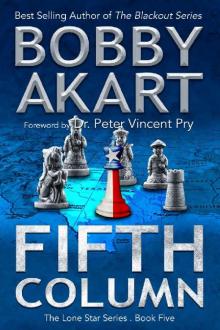 Fifth Column_Post Apocalyptic EMP Survival Fiction
Fifth Column_Post Apocalyptic EMP Survival Fiction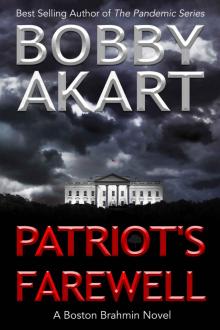 Patriot's Farewell
Patriot's Farewell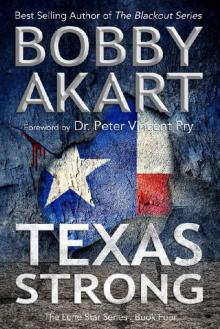 Texas Strong_Post Apocalyptic EMP Survival Fiction
Texas Strong_Post Apocalyptic EMP Survival Fiction Pandemic: The Innocents: A Post-Apocalyptic Medical Thriller Fiction Series (The Pandemic Series Book 2)
Pandemic: The Innocents: A Post-Apocalyptic Medical Thriller Fiction Series (The Pandemic Series Book 2) Shiloh Ranch: A Post Apocalyptic EMP Survival Fiction Series (The Blackout Series Book 4)
Shiloh Ranch: A Post Apocalyptic EMP Survival Fiction Series (The Blackout Series Book 4)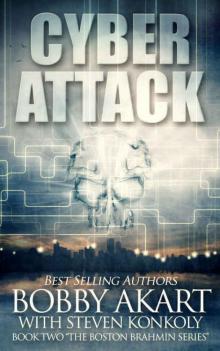 Cyber Attack
Cyber Attack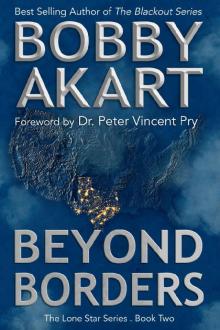 Beyond Borders
Beyond Borders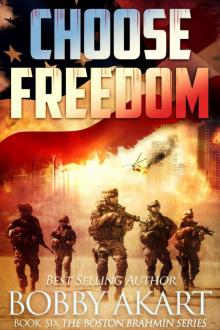 Choose Freedom: A Post-Apocalyptic Fiction Series (The Boston Brahmin Book 6)
Choose Freedom: A Post-Apocalyptic Fiction Series (The Boston Brahmin Book 6) False Flag
False Flag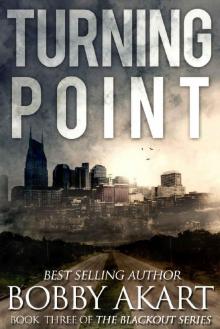 Turning Point: A Post Apocalyptic EMP Survival Fiction Series (The Blackout Series Book 3)
Turning Point: A Post Apocalyptic EMP Survival Fiction Series (The Blackout Series Book 3)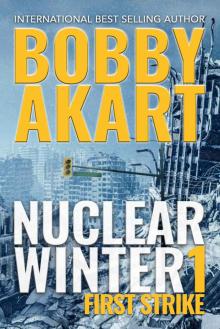 Nuclear Winter First Strike
Nuclear Winter First Strike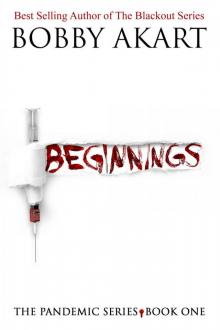 Pandemic: Beginnings: A Post-Apocalyptic Medical Thriller Fiction Series (The Pandemic Series Book 1)
Pandemic: Beginnings: A Post-Apocalyptic Medical Thriller Fiction Series (The Pandemic Series Book 1)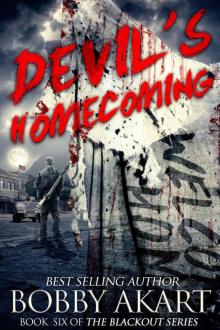 Devil's Homecoming: A Post Apocalyptic EMP Survival Fiction Series (The Blackout Series Book 6)
Devil's Homecoming: A Post Apocalyptic EMP Survival Fiction Series (The Blackout Series Book 6) The Blackout Series (Book 6): Devil's Homecoming
The Blackout Series (Book 6): Devil's Homecoming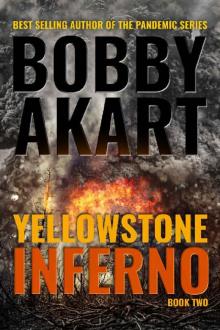 Yellowstone: Inferno: A Post-Apocalyptic Survival Thriller (The Yellowstone Series Book 2)
Yellowstone: Inferno: A Post-Apocalyptic Survival Thriller (The Yellowstone Series Book 2)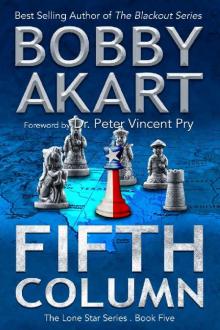 Fifth Column: Post Apocalyptic EMP Survival Fiction (The Lone Star Series Book 5)
Fifth Column: Post Apocalyptic EMP Survival Fiction (The Lone Star Series Book 5)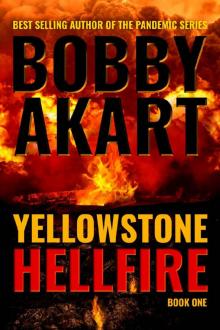 Yellowstone: Hellfire: A Post-Apocalyptic Survival Thriller (The Yellowstone Series Book 1)
Yellowstone: Hellfire: A Post-Apocalyptic Survival Thriller (The Yellowstone Series Book 1) The Blackout Series (Book 2): Zero Hour
The Blackout Series (Book 2): Zero Hour Suicide Six: Post Apocalyptic EMP Survival Fiction (The Lone Star Series Book 6)
Suicide Six: Post Apocalyptic EMP Survival Fiction (The Lone Star Series Book 6) Suicide Six_Post Apocalyptic EMP Survival Fiction
Suicide Six_Post Apocalyptic EMP Survival Fiction Zero Hour: A Post-Apocalyptic EMP Survival Fiction Series (The Blackout Series Book 2)
Zero Hour: A Post-Apocalyptic EMP Survival Fiction Series (The Blackout Series Book 2)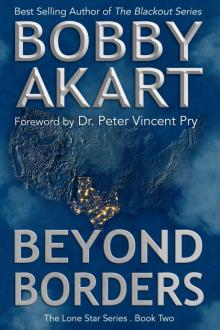 Beyond Borders_Post Apocalyptic EMP Survival Fiction
Beyond Borders_Post Apocalyptic EMP Survival Fiction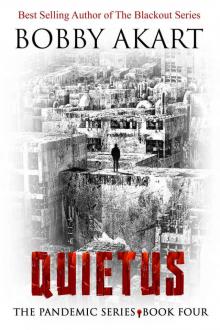 Pandemic: Quietus: A Post-Apocalyptic Dystopian Fiction Series (The Pandemic Series Book 4)
Pandemic: Quietus: A Post-Apocalyptic Dystopian Fiction Series (The Pandemic Series Book 4)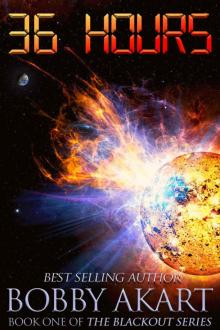 36 Hours: A Post-Apocalyptic EMP Survival Fiction Series
36 Hours: A Post-Apocalyptic EMP Survival Fiction Series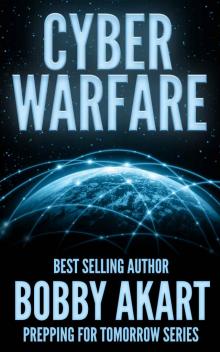 Cyber Warfare
Cyber Warfare